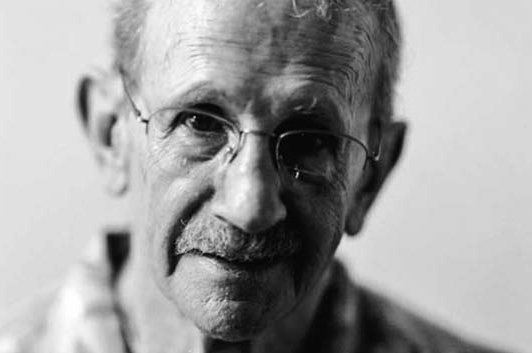 |
| Philip Levine [Beatrice] |
from Philip Levine's The Bread of Time: Toward an Autobiography:
Much to my horror, my Petrarchan sonnet was selected for discussion on that third meeting. (I believe the poem no longer exists; I had the good luck never to have had it accepted for publication.) Actually, it was not that bad: it was about food, which had been an obsession of mine for several months; I was running out of money and so ate very little and very badly. To be more precise, the poem was about my mother's last Thanksgiving feast, which I had returned home to participate in; since my mother was a first-rate office manager and a tenth-rate cook, the event had been a disaster. John [Berryman] discussed four poems that day. The first was not a Petrarchan sonnet, and as far as he could determine had no subject or any phrasing worth remembering. The second did have a subject, but John went to the board to scan its meter. "This is NOT iambic," he said. After getting through four lines, he turned and headed directly toward the cowering poet, suspended the page over his head, and finally let it fall. "This is metrical chaos. Pray you avoid it, sir." I was next. Much to my relief, John affirmed that, yes, this was a Petrarchan sonnet; it was iambic and it did possess a fine subject — the hideous nature of the American ritual meal become a farce. He paused. "But, Levine, it is not up to its most inspired moments — it has accepted three mediocre rhymes, it is padded where the imagination fails. If it is to become a poem, the author must attack again and bring the entirety up to the level of its few fine moments." In effect, John was giving us a lesson in how poems are revised: one listened to one's own voice when it was "hot" (a word he liked) and let that "hot" writing redirect one toward a radical revision. "No hanging back," he once said. "One must be ruthless with one's own writing or someone else will be." (I tried but failed to improve the poem. Even at twenty-six, I had not learned to trust the imagination.)
It was clear that, among those poems considered, mine had finished second best, and for this I was enormously relieved. What follows is the best, exactly in the form we saw it on that late February Monday in 1953:
Sonnet by Donald Justice
The wall surrounding them they never saw;
The angels, often. Angels were as common
As birds or butterflies, but looked more human.
As long as the wings were furled, they felt no awe.
Beasts, too, were friendly. They could find no flaw
In all of Eden: this was the first omen.
The second was the dream which woken the woman:
She dreamed she saw the lion sharpen his claw.
As for the fruit, it had no taste at all.
They had been warned of what was bound to happen;
They had been told of something called the world;
They had been told and told about the wall.
They saw it now; the gate was standing open.
As they advanced, the giant wings unfurled.
After reading the poem aloud, John returned to one line: "As for the fruit, it had no taste at all." "Say that better in a thousand words," he said, "and you're a genius." He went on: "One makes an assignment like this partly in jest, partly in utter seriousness, to bring out the metal in some of you and to demonstrate to others how much you still need to learn. No matter what one's motives are, no teacher has the right to expect to receive something like this: a true poem." Class dismissed.
love this whole post immensely!
ReplyDelete